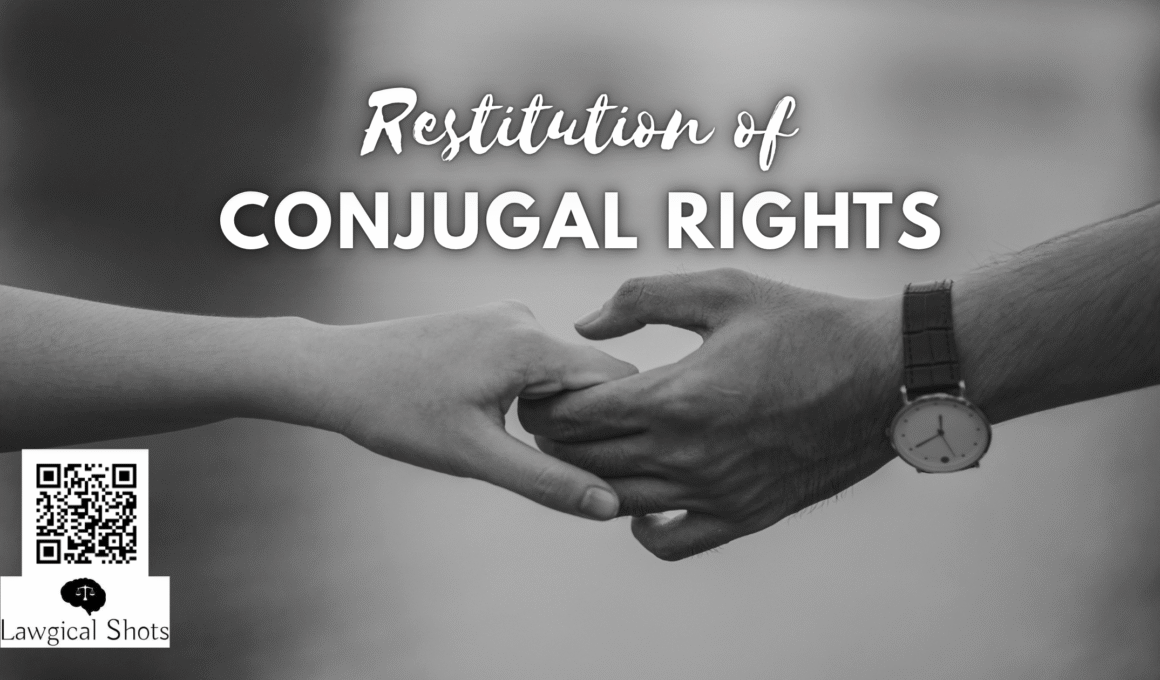Marriage in India is not merely a social or religious union. It is also a legal relationship carrying certain mutual rights and obligations. Married couples in ideal circumstances live together and raise their family. But what happens when one spouse leaves another without any reason? The other spouse has a matrimonial law remedy called Restitution of Conjugal Rights (RCR). It allows a spouse to approach the Court for help when the other spouse has withdrawn from their company without a reasonable cause.
In other words, restitution of conjugal rights is a legal tool to restore marital cohabitation. The Court issues a decree that compels the other spouse to resume living with the petitioner. Let us skim through the fundamentals of RCR in India.
Restitution of Conjugal Rights Meaning
“Restitution” in general means restoration, and “conjugal” relates to marriage or the relationship between a married couple. Conjugal rights are the set of rights of married couples to share companionship, and enjoy marital relations. Thus, Restitution of Conjugal Rights hints at the restoration of marital privileges when one spouse has withdrawn from the society of the other without any justification.
Essential Elements of Restitution of Conjugal Rights
To obtain a decree for RCR, the petitioner must prove the following:
- The respondent has withdrawn from their society;
- The withdrawal is without reasonable cause; and
- The marriage between the parties is valid.
If these conditions are met, the Court may pass a decree directing the respondent to resume cohabitation with the petitioner.
Religious Dissection of RCR
In India, marriage is particularly governed by personal laws, as discussed before. Therefore, provisions for restitution in marriage is given under specific religious laws as discussed below.
Restitution of Conjugal Rights in Hindu Law
Section 9 of the Hindu Marriage Act, 1955 expressly provides for restitution of conjugal rights. If the court is satisfied that there is no legal ground to refuse the decree, it may order restitution. The provisions of Hindu Marriage Act apply to Hindus, Buddhists, Jains, and Sikhs.
RCR in Muslim Law
There is no codified provision for restitution of conjugal rights in Muslim law. However, the right is well-recognized underMuslim laws in practice and enforced through Courts. The concept was first acknowledged in Moonshee Buzloor Ruheem v. Shumsoonnissa Begum (1867), where the Privy Council held that a Muslim husband could seek restitution of conjugal rights if the wife withdrew from his company without a valid reason, and vice versa.
Restitution of Conjugal Rights under Divorce Act, 1869
For Christians in India, Section 32 of the Indian Divorce Act, 1869 brings in the remedy of restitution of conjugal rights. It allows either spouse to apply to the District Court for restitution if the other spouse has withdrawn without reasonable excuse. The Court, upon hearing both the sides, if satisfied, may decree restitution of conjugal rights.
RCR Under Parsi Marriage and Divorce Act, 1936
Section 36 of the Parsi Marriage and Divorce Act, 1936 provides a similar remedy. Either spouse can petition for restitution when the other has withdrawn from the society without reasonable cause. The decree aims to preserve the bond of marriage and promote reconciliation in case of discord.
Restitution of Conjugal Rights Under the Special Marriage Act, 1954
The Special Marriage Act, 1954, which governs inter-faith and civil marriages, provides for remedy of RCR under Section 22. It mirrors the wording of Section 9 of the Hindu Marriage Act, granting either spouse the right to petition for restitution if the other withdraws without reasonable excuse.
Enforcement and Legal Effect
A decree of restitution of conjugal rights is a civil order. It does not authorize the use of physical force but seeks to promote mutual resolution of discord among married couples. If the respondent fails to comply with the decree, the order can be executed under Order XXI, Rule 32 of the Civil Procedure Code (CPC), allowing attachment of property. In addition, the non-compliance of decree of restitution of conjugal rights for over a year or so may itself become a ground for divorce under various personal laws.
Conclusion
Restitution of Conjugal Rights, though rooted in the idea of preserving marriage, raises complex questions about a person’s autonomy, dignity, and consent. While it exists across all major personal laws in India be it Hindu, Muslim, Christian, Parsi, or civil marriages. However, the liberal constitutional lens makes one rethink whether a remedy like RCR aligns with the idea of equality and privacy in marriage. The lawmakers and courts often find it challenging to balance matrimonial rights with individual freedom. The task that continues to shape the future of family law in India.
FAQs on RCR in India
Q. What is the purpose of restitution of conjugal rights?
A. The essence of a marriage lies in togetherness. A couple is supposed to live together after marriage, unless staying apart is a mutual decision for justified reasons like job, etc. The purpose of RCR is to bring the couple together when one of them leaves another’s company without any reason.
Q. What are the conjugal rights of a husband?
A. RCR laws extend similar rights for both husband and wife. If a wife leaves the company of her husband without any justification, the husband has the right to bring her back through the decree of the Court.
Q. What if wife denies restitution of conjugal rights?
A. If the wife does not agree to restoration of conjugal rights, she has to justify before the Court. If her stance is unreasonable, the Court may order attachment of her property.
Q. How to win restitution of conjugal rights?
A. A spouse has to prove that the other spouse left his/her company without any valid reason. Since it is about conjugal rights, one has to prove the existence of a valid marriage between them.
Q. Is RCR a ground for divorce?
A. Failure of restitution of conjugal rights may become a ground for divorce, depending upon the particular religion. For example, under Hindu Marriage Act, in case a decree for RCR was passed and there has been no restitution for a period of 1 year or more, either spouse may present a petition for divorce.








